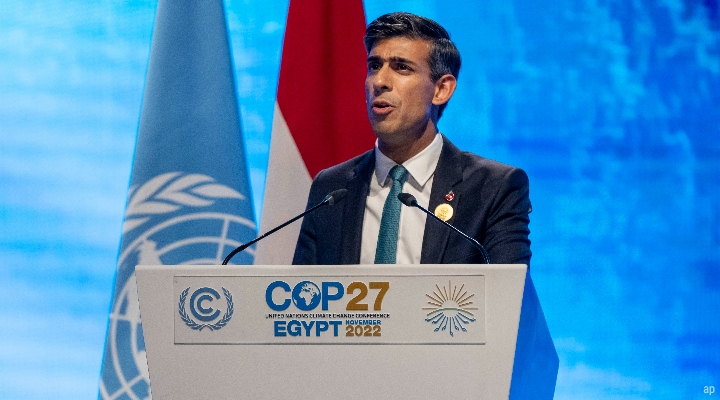
It was a year that brought catastrophic flooding to Pakistan, wildfires in Europe, and drought around the world, all the latest consequences of global warming.
In the US, as UN secretary general António Guterres noted in October, Hurricane Ian "delivered a brutal reminder that no country and no economy is immune from the climate crisis."
These are the issues facing the world as nations gather in Sharm El Sheikh, Egypt, for the climate summit known as COP27, which opened at the end of last week.
This is the same summit where nations met 12 years ago to sign the Paris Agreement to curb climate change. Since then, a flurry of national pledges to slash greenhouse gas emissions to net zero (to take as much carbon out of the atmosphere as one is putting in) by 2050 has materialised. The target is aimed at keeping global temperatures to 1.5 degrees above preindustrial levels, forestalling the worst effects of global warming.
The arc of climate change is a lot like parenting: the days are long, but the years are short. To get to net zero credibly, companies and nations need to have slashed emissions by 45% by 2030. That's just seven years away.
"Climate change isn’t a potential risk anymore, it’s a certainty," said Annie Chor Joyce, head of ESG at Amundi US, speaking at a recent Reuters ESG conference.
For investors, the world’s move to reduce carbon will create risks and opportunities aplenty.
'A Workman’s COP' as CEOs Pull Out
This year’s climate summit "will be the workman’s COP," says Ian Simm, chief executive of Impax Asset Management, referring to the summit's acronym. "It’s important the statements coming out of COP27 reconfirm [those] from COP26, and no backsliding."
Last year’s summit resulted in agreements to reduce coal plants and methane emissions, roll back deforestation, and finance efforts by developing nations to address global warming.
"It was a success because of the momentum it created around achieving net zero by 2050," Hortense Bioy, global director of sustainability research for Morningstar, said at a recent briefing for reporters.
That momentum will be harder than usual to achieve this year. The Russia-Ukraine conflict coincided with food and energy shortages that sent prices soaring for fossil fuels. Such complications may be one reason a number of key executives have decided against attending the summit, including BlackRock CEO Larry Fink and Citigroup CEO Jane Fraser.
"My concerns around COP27 are that a lot of bank and asset manager CEOs have pulled out," raising questions about effectiveness, says Anya Solovieva, global commercial lead on climate solutions at Morningstar Sustainalytics.
Key Areas of Focus and Concern at COP27
Here's what to watch out for at the conference:
Hopes of Policy Progress Are Tepid
Signatories to the Glasgow Financial Alliance for Net Zero (GFANZ), a group of leading financial institutions committed to decarbonising the global economy, have said their commitments are contingent on government action to introduce policy changes. "If governments are not delivering, then the GFANZ signatories won’t deliver either," says Bioy. And Thomas Kuh, global head of ESG strategy for Morningstar Indexes, notes pension funds around the world are pushing to address climate change, partly through ESG data, tools and investment practices. "Asset owners are looking for an array of key participants across the ESG ecosystem to drive change," Kuh writes.
Climate Justice is Now Mainstream
Developing countries want an agreement on financial assistance for climate-related loss and damage. At last year’s COP in Glasgow, rich nations agreed to start a "dialogue" on the subject. Since an African nation is hosting COP27 this year, there will be a louder emphasis on why it’s in investors’ interest to focus on climate justice, says Elizabeth Small, head of policy for CDP North America, a nonprofit that runs a global disclosure system on environmental impacts.
Adds Jacqueline Novogratz, CEO of Acumen, a global venture capital fund that addresses global poverty: "we expect to embed climate justice at the core of everything we participate in" during COP27 conversations in Egypt. "Our No. 1 expectation is to bring the poor into the climate conversation. Too many of these conversations leave out the poor altogether."
There's No Climate Justice Without Biodiversity Justice
Biodiversity is intertwined with climate justice. On 7 December, the UN will host a biodiversity conference in Montreal. Biodiversity is critical because economic activity depends so heavily on nature: the world subsists on rice, corn and wheat. "That’s enormous dependency on a relatively narrow base that’s resilient from pests," says Simm. "It’s in our direct interest that biodiversity exists in the food and agriculture chain."
The Water and Wood Crisis Isn't Going Away
Water and deforestation were among the key themes from last year’s summit. Says Carole Laible, CEO of Domini Impact Investments: "I personally would like to see a consideration of no more roads built in untouched forests."
What it Means for Investors
All these considerations create an array of risks and opportunities for investors. "The whole project of decarbonising is the largest intentional reshaping of the economy," said Paul Bodnar, BlackRock’s global head of sustainable investing, at a recent conference.
In an interview with Morningstar, Deirdre Cooper, who manages Vanguard Global Environmental Fund VEOIX, notes the world is currently investing more than $600 billion a year in climate finance. "If we move to a net-zero scenario, that number needs to be $4-$6 trillion."
Indeed, the Russia-Ukraine conflict has focused attention on the need for energy efficiency. "It’s sent a powerful signal to everybody to save energy. Energy efficiency opportunities have never had it so good," Simm says.
One positive note: the US Inflation Reduction Act of 2022, providing tax credits for U.S. companies in renewable energy, electric cars, and energy efficiency. That’s helping with the mainstreaming of what once was called alternative energy. Indeed, the new law "sets us up to deliver low-cost highly visible energy systems that will aid a manufacturing renaissance" in the US, says Vanguard’s Cooper.
And Morningstar analysts are here to help you understand the risks and opportunities of climate change. Jon Hale, director of sustainability research for Morningstar, recently offered a list of funds and ETFs that might benefit from the Inflation Reduction Act.
Bioy also notes funds tracking climate benchmarks have seen extraordinary growth and existing conventional and sustainable funds are converting into fully-fledged climate funds. Alyssa Stankiewicz, ESG research analyst for Morningstar, adds that one way to ensure your fund is addressing climate change is through Morningstar’s new impact metrics.
In the coming days, watch out for our new articles and videos around COP27, including our special report on Investing in Water. Meanwhile, have a look at our previous special reports on investing in energy and investing in food.
You can also check our Investable World site for more information, as well as our sister company, Morningstar Sustainalytics.
Further Reading
Investing in Water May Be Appealing, but Fund Investors Have Few Compelling Choices
Here are some water stocks and water funds to consider.
Thematic Funds Are Popular—and Risky
What to know about managing those risks.
Hate the Sin, Love the Stock: Investors’ ESG Exclusions Leave Opportunities
Undervalued shares include AB InBev, Boston Beer, Imperial Brands, and Roblox.
Sustainalytics: Investing in Water for Positive Impact
Sustainalytics: The Emergence of Water Risk: From Marginal to Systemic











:quality(80)/cloudfront-us-east-1.images.arcpublishing.com/morningstar/6BCTH5O2DVGYHBA4UDPCFNXA7M.png)

















